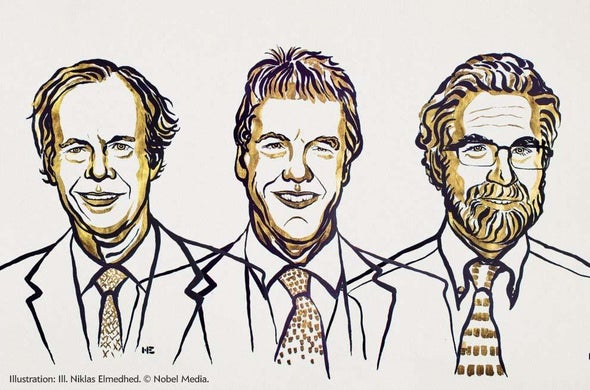(单词翻译:单击)
听力文本
This is Scientific American — 60-Second Science, I'm Steve Mirsky.
"The Nobel Assembly at Karolinska Institute has today decided to award the 2019 Nobel Prize in Physiology or Medicine jointly to William Kaelin, Sir Peter Ratcliffe and Gregg Semenza for their discoveries of how cells sense and adapt to oxygen availability."
Thomas Perlmann, secretary of the Nobel Assembly, shortly after 5:30 A.M. (Eastern Time).
"Gregg Semenza was born in 1956 in New York. He performed his prizewinning studies at Johns Hopkins University in Baltimore, where he's still active. Sir Peter Ratcliffe was born in 1954 in Lancashire in the U.K. He performed his prizewinning studies at Oxford University. And he's continuing to do his research at Oxford University, and he's also at the Francis Crick Institute in London. And William Kaelin, born in 1957 in New York—he performed his prizewinning studies at the Dana-Farber Cancer Institute in Boston, where he's still active in his own lab."

Karolinska Institute researcher Randall Johnson studies the effects of low oxygen. He explained the significance of the work of the new Nobel laureates:
"This year's Nobel Prize is awarded for determining how oxygen levels are sensed by cells. Oxygen is essential for life and is used by virtually all animal cells in order to convert food to usable energy. However, the amount of oxygen available to cells, tissues and animals themselves can vary greatly. This prize is for three physician-scientists who found the molecular switch that regulates how our cells adapt when oxygen levels drop."
"Applications of these findings are already beginning to make their way to the clinic, with potential drugs used to treat anemia and to treat some forms of cancer. These fundamental findings have greatly increased our understanding of how the body adapts to change. And applications of these findings are already beginning to affect the way medicine is practiced. This year's three laureates have greatly expanded our knowledge of how physiological response makes life possible."
For an in-depth listen about the 2019 Nobel Prize in Physiology or Medicine, look for the Scientific American Science Talk podcast later today.
For Scientific American — 60-Second Science. I'm Steve Mirsky.
参考译文
这里是科学美国人——60秒科学系列,我是史蒂夫·米尔斯基。
“卡罗林斯卡学院诺贝尔大会今天决定将2019年诺贝尔生理学或医学奖共同授予威廉·凯林、彼得·拉特克利夫爵士以及格雷格·塞门扎,以表彰他们发现了细胞如何感知和适应氧气的可用性。”
美国东部时间早上5点30分稍过,诺贝尔大会秘书托马斯·珀尔曼宣布了这一消息。
“格雷格·塞门扎1956年出生于纽约。他在巴尔的摩的约翰·霍普金斯大学进行获奖研究,现在依然在该校从事研究。彼得·拉特克利夫爵士1954年出生于英国的兰开夏郡。他在牛津大学进行获奖研究。他现在仍在牛津大学和伦敦的弗朗西斯克里克研究所从事研究工作。威廉·凯林1957年出生于纽约,他在波士顿的丹娜·法伯癌症研究院进行获奖研究,目前仍在自已的实验室从事研究工作。”
卡罗林斯卡学院的研究员兰德尔·约翰逊研究低氧效应。他解释了新任诺贝尔获奖者的研究的重要性:
“今年的诺贝尔奖颁发给确定细胞感知氧气水平方式的科学家。氧气是生命所必需的,几乎所有动物细胞都用氧气将食物转化为可用能量。然而,细胞、组织和动物本身所能获得的氧气量可能在很大差异。这个奖项颁给三位医生科学家,他们发现了一种分子开关,可以在氧气水平下降时调节细胞的适应方式。”
“这些发现和用于治疗贫血和某些癌症的潜在药物一起,已经开始进入临床应用。这些基础发现大大增加了我们对人体如何适应变化的理解。这些发现的应用已经开始影响医学实践的方式。今年的三位获奖者极大扩展了我们对生理反应如何使生命成为可能的认知。”
若想深入了解2019年诺贝尔生理学或医学奖,请收听今天晚些时候播出的《科学美国人》“科学对话”播客。
谢谢大家收听科学美国人——60秒科学。我是史蒂夫·米尔斯基。
译文为可可英语翻译,未经授权请勿转载!
重点讲解
重点讲解:
1. decide to do sth. 决定,拿定主意(做);
She decided to do a secretarial course.
她决定修一门文秘课程。
2. adapt to 适应;
The world will be different, and we will have to be prepared to adapt to the change.
世界会变得不同,我们必须做好准备以适应其变化。
3. in order to do sth. 为了;以便;目的在于;
In order to get a complete picture, further information is needed.
为掌握全面情况,还需要详细资料。
4. convert to 使)转变,转换,转化;
Converting metric measurements to U.S. equivalents is easy.
将公制计量换算成美制计量非常简单。


